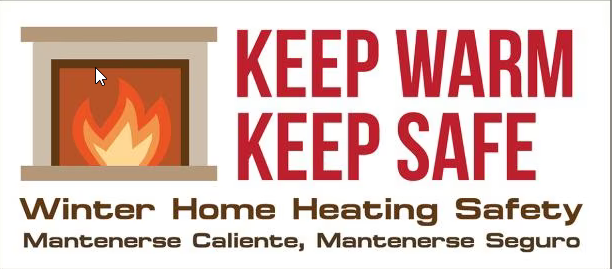Chief Don Stats and the North Reading Fire Department ask residents to take these simple steps to make sure they Keep Warm, Keep Safe this winter.
Home fires peak from December through February when the cold weather has us spending more time indoors, heating systems are in regular use, and some may turn to alternatives such as space heaters and wood or pellet stoves. Chief Stats said, “Many people are spending more time at home these days. As home has become our school and workplace, we may be using and taxing our heating appliances more than ever.”
Heating is a Leading Cause of Fire Deaths
In 2019, Massachusetts fire departments responded to 1,381 heating related fires that caused one death, 19 injuries, 17 firefighter injuries, one civilian death, and $5.5 million in property damage.
Working Smoke Alarms Key to Fire Safety
Deputy Fire Chief Barry Galvin said, “No one thinks fire will happen to them, but having working smoke alarms on every level of your home will make sure you have time to escape if one does occur.” Chief Stats added, “Replace aging alarms – generally ten years for smoke alarms and 5-7 for CO alarms. Expired alarms cannot be counted on to alert you and your family to danger.” When replacing smoke alarms, newer models that have 10-year sealed, non-replaceable batteries are now required. After ten years the entire alarm needs to be replaced, but no more replacing batteries. Deputy Galvin added, “Working smoke alarms coupled with a practiced escape plan increase your family’s chances of surviving a fire.”
Easy Steps to Prevent Heating Fires
Stats said, “As we turn on the furnaces and light up the wood stoves and fireplaces, it is important to give them a check-up to make sure they’re ready to heat our homes safely this winter. Preventive maintenance like having the chimney cleaned or the furnace checked out by a certified professional can save money and prevent fires and carbon monoxide poisoning.”
Efficiently running furnaces cost less to run and are less likely to become a source of carbon monoxide in the home. Natural gas and fuel oil are both safe and efficient, but remember to get yearly tune-ups. “It’s not too late to have a tune-up to prevent problems; we’re still early in the heating season,” said Chief Stats.
If you heat your home by burning solid fuels such as coal, firewood, or pellets, have the chimney cleaned by a certified professional each year who can also check for cracked and broken mortar. Most chimney fires start when built up creosote ignites or when heat escapes the chimney through a crack and ignites the structure.
Dispose of Ashes Safely
Dispose of the ashes in a metal container, with a secure lid, away from the house. A single ember can stay hot for days without being detected and easily fanned back to life. So many fires have started when ashes were placed inside cardboard boxes, paper bags or plastic containers, and then stored inside the garage, the breezeway, or under the porch.
Space Heaters Need Space
Space heater fires are rare but often deadly. Plug space heaters directly into the wall outlet; do not use extension cords. Most space heater fires are extension cord fires. Place heaters 3-feet away from things that can catch fire such as furniture, bedding, newspapers, drapes, and clothes. Teach children to keep 3-giant steps away from heaters, all stoves and fireplaces.
Keep Warm, Keep Safe
If you have any questions about home heating, contact your local fire department or visit the web site, www.mass.gov/keepwarmkeepsafe. By working together we can keep warm and keep safe.

